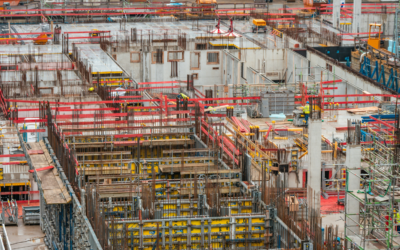Construction companies are big contributors to a country’s economy and the industry has seen massive growth in the last decade. Homes and commercial buildings are always in demand as populations continue to grow, and this has led to the establishment of construction companies that specialize in these areas. Residential and commercial construction are two distinct areas in the construction industry. There are clear differences between a residential and commercial construction company. In this article, we will explore these differences to give you a better understanding of what sets these two types of construction apart.

Residential vs. Commercial Construction Company | Construction Purpose
Every aspect of construction, from planning to execution, is influenced by the purpose of the building. Residential construction firms concentrate on creating livable, comfortable spaces designed to meet the daily needs of families and individuals. They often deal with more detailed and intricate designs, employing materials that contribute to aesthetics, comfort, and efficiency. For example, a residential project might use softer materials, have more windows for natural light, and a more complex interior layout.
On the other hand, a commercial construction company focuses on developing functional, efficient structures that can withstand heavy use and comply with stringent safety codes. These buildings, which include hotels, factories, office complexes, and warehouses, often prioritize utility and durability over aesthetic appeal. Commercial construction projects typically use tougher, more durable materials and have more open layouts to accommodate different commercial needs. For example, a warehouse would need strong, resistant materials capable of supporting heavy machinery and products, ample space for storage and movement, and less emphasis on aesthetic design.

Residential vs. Commercial Construction Company | Size and Scale
In the realm of construction, the terms ‘size’ and ‘scale’ often reflect the breadth and complexity of a project. Residential construction, generally tailored to individual or family needs, typically encompasses small-scale projects. Residential properties—whether single-family homes, duplexes, or small apartment buildings—usually have a predetermined scope, limiting the extent of the project. The workforce required for these projects is also less, involving perhaps a handful of architects, masons, electricians, and other skilled laborers.
Contrastingly, commercial construction presents an entirely different picture. Commercial construction company projects, such as multi-story office buildings, shopping malls, or industrial complexes, boast a larger scale due to their intended high-usage purpose. These projects necessitate a robust labor force comprising various specialist teams. For instance, apart from architects and builders, there might also be teams dedicated to HVAC installations, electrical setup, plumbing, elevator installations, and more. Furthermore, the complexity of commercial building designs often necessitates intricate coordination among different teams, making commercial construction sites a bustling hub of diverse activities. The massive scale of commercial construction projects, thus, requires careful planning, extensive resources, and efficient management to ensure successful completion.

Residential vs. Commercial Construction Company | Regulations
Regulatory compliance is a fundamental aspect of both residential and commercial construction. These regulations, often set by national or local government authorities, define the standards for construction practices, ensuring safety, durability, and functionality of the built structures.
For commercial construction, the regulatory landscape is particularly stringent. The rationale lies in the extensive use and high occupancy of such buildings, necessitating robust structural integrity. Commercial construction projects are required to comply with a plethora of building codes designed to uphold safety and durability. These may include fire safety standards, earthquake resistance, accessibility provisions, and guidelines for electrical and plumbing installations, among others. Compliance to these regulations ensures that commercial buildings can safely accommodate heavy equipment, large workforce, and continuous usage over an extended period.
Conversely, residential construction regulations are less demanding, focusing primarily on creating safe and comfortable living spaces. These regulations may encompass standard building codes, zoning laws, and aesthetic guidelines, depending on the local policies. For example, a homeowner may need to obtain permission for building extensions or modifications that alter the property’s external appearance. Despite the relatively relaxed regulatory framework, it’s essential for homeowners to comply with these rules to ensure that their homes align with community standards and provide a safe, habitable environment.

Residential vs. Commercial Construction Companies | Experience and Expertise
Residential construction companies possess unique skills and knowledge that cater to the specific needs of residential projects. They have a firm understanding of zoning rules and environmental regulations, which are vital for planning and constructing homes that comply with local guidelines. Additionally, they are adept at designing and building structures that provide comfort, functionality, and aesthetic appeal for individuals and families. This expertise extends to the use of appropriate materials, managing smaller construction teams, and ensuring the project adheres to the agreed-upon budget and timeline.
On the other hand, a commercial construction company is seasoned in constructing large-scale projects like office buildings, factories, and shopping malls. Their expertise lies in obtaining necessary government permits, handling comprehensive zoning requirements, and managing the complexities associated with commercial construction. This includes coordinating large, diverse teams of specialists, selecting materials that offer durability and functionality, and ensuring the structure’s longevity and safety under heavy use. Thanks to their experience with large-scale projects, a commercial construction company is well-equipped to anticipate and manage challenges that can arise during the new construction process, such as logistical issues or unforeseen site complications.

Commercial Construction Company Financing
The financing aspect of both commercial and residential construction projects is indeed another key point of distinction. Commercial construction projects, due to their colossal scale and multifaceted nature, typically involve substantial investment, potentially ranging from tens to hundreds of millions of dollars.
To handle these massive budgets, a commercial construction company must have a robust financial management system in place. Commercial construction company contractors often work in collaboration with various stakeholders, including banks, investors, and financial advisors, to secure and manage the necessary funds. This financing process is complex and nuanced, involving elements like obtaining large-scale loans, managing investor relations, ensuring cash flow for uninterrupted operations, and planning for contingencies.
Financing in Residential Construction
Conversely, construction projects involving residential construction are relatively smaller in scale, and hence the associated budgets are considerably lower. The contractor’s fees are also comparatively less. However, this does not imply that the financing for residential projects is straightforward. The funding mechanisms for residential construction can vary widely, depending on the scale and nature of the individual projects.
Homeowners may fund smaller projects through personal savings or home equity loans, while larger projects might require conventional mortgage financing or construction loans. Some may even resort to crowdfunding or seek government grants for specific situations. The residential contractor’s role also extends to advising homeowners on the most suitable funding option, helping them navigate through loan applications, and ensuring the project stays within the budget. Thus, while the monetary figures involved might differ significantly, the importance of sound financial management is paramount in both commercial and residential construction.

Are You in Need of Commercial Construction Company Services?
Are you in need of commercial construction services? Look no further than South Coast Improvement Company. With our strong reputation and exceptional customer service, we strive to meet all of our clients’ Commercial Design, Construction, & Management needs.
Our experienced team of professionals have successfully completed a wide range of commercial exterior and interior design projects, from senior living facilities to complex commercial projects. We understand that each project is unique, and we work closely with our clients to ensure their specific needs are met. Trust us to bring your vision to life and exceed your expectations with our high-quality work and attention to detail. Contact us today to get started on your next project.

Conclusion
In summary, commercial and residential construction present distinct characteristics and challenges. These differences are evident in the purpose of the constructions, the scale of the projects, the financing involved, and the specific regulatory requirements each must meet. When embarking on a construction project, selecting a contractor with the appropriate skill set and experience in your sector of interest is of critical importance.
The divergence between residential and commercial design is primarily defined by factors such as size, scale, budget, and required expertise. As a project owner, you’ll need to consider these factors carefully to ensure your project’s success. The scope and size of your project will dictate the specialized expertise you’ll need from your construction company.
Choosing an experienced construction company that not only understands your unique needs but also has specialized knowledge in complex projects is crucial. This is because each type of construction, residential or commercial, requires distinct skills, knowledge, and experience. Whether you’re building a home designed for comfort and functionality or a commercial structure meant to withstand heavy usage, having the right team in place ensures your project’s success.
Overall, understanding the unique requirements of your project is crucial in selecting the perfect construction company. With a comprehensive grasp of your needs and the differences between residential and commercial construction, you’ll be well-equipped to make an informed decision that ultimately ensures the successful realization of your construction project.
In conclusion, understanding the distinction between residential and commercial construction is crucial when embarking on a construction project. It’s essential to collaborate with a construction firm that has the relevant expertise and experience to meet the specific demands of the project, ensuring its successful completion.
View Our Work
Aspen Dental
Partnering with The Aspen Group on the construction of a new Aspen Dental facility that’s functional & welcoming for patients & staff alike. South Coast Improvement Company was awarded the construction of a new Aspen Dental facility in Killingly, CT. The...
Springhouse Senior Living – HumanGood
Designed to enhance comfort & functionality. South Coast Improvement company was hired by HumanGood for an interior and exterior renovation at Springhouse Senior Living. Our skilled teamtransformed the 2nd through 5th floor common areas into brighter, more...






